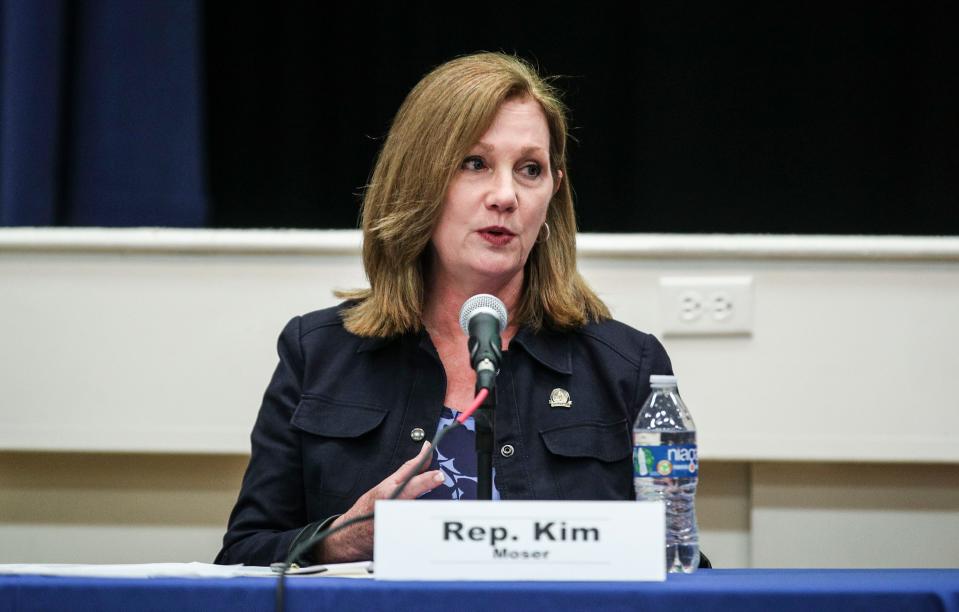Health insurance made me jump through hoops to get the treatment I need. It cost me my job.
My husband recently got a new job. Congratulations, right? Not when you have chronic illness. A new job means a new medical insurance plan and I have psoriatic arthritis, a potentially debilitating autoimmune disease. What should have been an exciting time of new beginnings for our family was instead fraught with worry. Medication I've been taking to control my disease for the past 14 years required prior authorization and our new insurance company denied my prescription. My rheumatologist started the appeals process. Meanwhile, my medication ran out and I anxiously waited.
What happened to me is not an anomaly. Patients across the country are left waiting and wondering while their physicians fight for access to treatment plans they've prescribed. A new bill sponsored by Rep. Kim Moser of Northern Kentucky aims to reform the prior authorization process for the commonwealth with House Bill 317.
If you've ever undergone a medical procedure, you've probably encountered prior authorization. HealthCare.gov defines it as a decision by your health insurer that determines if certain treatment plans, prescription drugs or durable medical equipment are "medically necessary." It determines what portion (if any) your insurance will pay. Prior authorization is time-consuming for medical providers and nerve-racking for patients awaiting treatment.
Prior authorization delays treatment, hurts patients
A 2022 American Medical Association survey found prior authorization delayed necessary treatment 94% of the time. This delay resulted in hospitalization 25% of the time.
Prior authorization issues: Processes need reform to improve the health of Kentuckians
I've been taking the same biologic medication for my autoimmune psoriatic arthritis since 2010. I know this fight well. The first time I was denied my prescription was shortly after my diagnosis. My insurance company favored a different, less expensive treatment and they required I try that first. They called this process "step therapy." I called it a nightmare.
Almost half (46%) of patients reported that their insurer subjected them to step therapy requirements, according to The American College of Rheumatology patient survey, and another 48% of patients reported that their provider needed to obtain prior authorization before obtaining a prescription.

Patients pay the price for America's medical bureaucracy
Prior authorization, step therapy and tiering supposedly happen to ensure a high standard of care for patients and to prevent waste, fraud and abuse. But while I jumped through the required hoops and took the medication the insurance company required instead of the medication my rheumatologist recommended, my condition worsened. Within six months, I deteriorated from walking with a cane to bedridden. I resigned from a job that I loved and my plans to have another child were canceled. I was heartbroken and it was preventable.
"Prior authorizations have become a bureaucratic barrier to health care," Rep. Moser wrote in an email to The Courier Journal. They "lead to dangerous delays for patients, frustrating and costly administrative burdens for health care providers and insurers alike."
This was certainly true for me. After months of appeals and what I can only imagine was mountains of paperwork from my care team, I was finally permitted to begin biologic treatment. This was a game-changer for me. It gave me my quality of life back and in 2015, I had my beautiful son.
It felt like I had won. But then my husband got a new job, and I had to fight all over again. This time it was for access to a medication I know works for me, and I know exactly what my life looks like without it. It was, and is, hard for me to see anything but greed in this process. The insurance rejection letter read that my medication had been denied because "(t)here are medical treatments for many conditions that have lower-cost, but equally effective alternatives available based on clinical guidelines." This tells me that money is the driver, not concern for my care. What does it matter if another medication will help me save on my co-pay if the medication isn't effective and I lose my job in the process of giving it a try?
I understand that guidelines exist for a reason, but what I have a hard time understanding is why an insurance company would require prior authorization for a chronic illness medication that I've already been taking. Nor do I understand how they can justify denying a current effective treatment plan.
Kentucky needs prior authorization reform
The American Medical Association, along with 16 other physician, patient and health care organizations such as the American College of Radiology, the American College of Rheumatology and the American Academy of Family Physicians support prior authorization reform. One way that's getting traction is called the Gold Card approach. In 2023, 30 states introduced legislation for prior authorization reform. Kentucky was one of them. So far Texas, West Virginia, Louisiana and Michigan have passed legislation in favor of Gold Carding.

In the past two legislative sessions, Rep. Moser has sponsored bills hoping to bring prior authorization reform to the commonwealth, but the bills haven't even gotten a reading. This year's HB 317 has the support of 10 Kentucky medical associations.
There is a groundswell calling for prior authorization reforms both at the state and federal level. With Texas leading the way, the GOLD Card Act of 2023 also has the potential to bring nationwide prior authorization reform for medical providers and their patients. Also, on Jan. 17, Centers for Medicare and Medicaid Services finalized new rules regarding prior authorization for certain Medicare and Medicaid payers. Starting in 2026, payers will be required to send prior authorization decisions within 72 hours for urgent requests and within seven calendar days for all others. This will significantly reduce patients' wait time for access to necessary medical treatment. Payers will also be required to give their reason for denying a request as well track and publicly report their prior authorization metrics.
KY needs universal lead screening. Our home was poisoning our son and we didn't know how.
What is the 'Gold Card' approach to prior authorization?
"Gold Carding" doesn't remove prior authorization, but it helps experienced physicians with high prior authorization approval rates streamline the process. It's a waiver system where doctors become "Gold Carded," or saved from having to submit prior authorization requests for certain medications and services. Kentucky's HB 317 doesn't call it Gold Carding like other states' legislation does but the bill similarly permits health care providers to become exempt from prior authorization requirements if 90% of their prior authorization requests submitted in a six month review period are approved.
Our health care system needs an overhaul, and the prior authorization process is a good place to start. I want my rheumatologist to focus on my care and I want uninterrupted access to the maintenance medications I need to sustain my quality of life. I should not be subject to unnecessary flares in my disease while waiting for prior authorization, just to appease the pocketbook of insurance companies.

Bonnie Jean Feldkamp is the opinion editor for The Louisville Courier Journal. She can be reached via email at [email protected] or on social media @WriterBonnie.
This article originally appeared on Louisville Courier Journal: Prior authorization hurts patients, denies care. KY needs Gold Card
